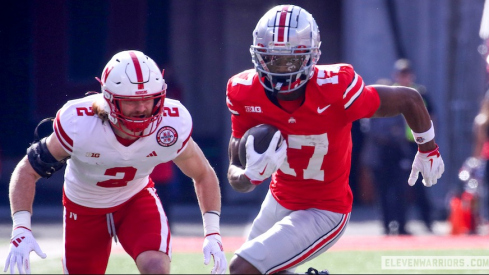March 2011 sucked.
It was a straight up cavalcade of awfulness. Yes, there was the whole oh crap, beloved Ohio State coach Jim Tressel might lose his job over some discounted tattoos thing, but what was almost as bad was having to write about it on a regular basis.
That's our job, and we did it. We also get to talk about things that are way more fun, like J.T. Barrett being cool as heck, or a fresh new recruiting camp Urban Meyer is trying out this year, or how many family football tickets Greg Schiano is getting this season. Eleven Warriors and other news sites are able to get that information - at least in part through public records requests that, by law, must be completed by the university.
SUNSHINE
Sunshine laws allow for the public to access records from public institutions. This includes local, state, and federal governmental organizations (the sunshine verbiage comes from The Government in Sunshine Act of 1976, one of a number of Freedom of Information Acts passed by Congress in the 1970s), and public organizations like state colleges and universities.
They've become an essential part of a reporter's toolkit in reporting and investigating public institutions, and in sports they can give us insight into places within athletic programs that we would never see otherwise - which is why I want to bring your attention to a potential Georgia law, which sets a worrisome precedent because it weakens the ability for the news media to report on college athletics. DawgNation.com explains it this way:
Georgia’s current law is that a school must produce a requested record within three days, or provide a timetable at that time. A bill that [State Representative Earl] Ehrhart co-sponsored is now on Gov. Nathan Deal’s desk, and would expand that to 90 days. That would severely hinder the ability of the media to provide real-time watchdog ability on athletics departments and teams, according to media members and open records advocates.
Rep. Ehrhart has reasoned that his bill "just allows us to play on the same field as Alabama and everybody else," (whether he's referring to the state or the rival football team is up for debate) and that athletic departments don't have the capacity to handle the information requests that they receive in the timely manner dictated by current law. But Hollie Manheimer, Executive Director of the Georgia First Amendment Foundation points out that
"It would make secret contract terms, letters of complaint or inquiry from the NCAA, plans for the expenditure of university and athletic association funds ...No other public agency in Georgia is given 90 days to conduct its business in secret."
In other words, new Georgia head coach Kirby Smart - or any other coach or administrator subject to these kinds of information requests - would now have three months to get ahead of or even possibly subvert an investigation into whatever story might be related to those records.
INTERFERENCE
This isn't the first time that the Georgia legislature has waded into college sports. Last year it passed the "Gurley Law," which criminalizes using cash or other incentives to lure student athletes into breaking NCAA rules, making it a high level misdemeanor punishable with up to a $5,000 fine and a year in jail. The message sent is clear: the Georgia government is willing to go to fairly extensive lengths to try and legislate an SEC championship.
Of course, there are other ways to block investigations into government activities. One tactic is to simply make it too expensive to even ask for them. EDSBS wrote Thursday about an FOIA request that the University of Georgia wanted $18,000 to complete. A Texas city wanted to charge Gawker nearly $80,000 to look for a series of emails. Smaller, more focused news media sites are increasingly doing their own investigative work, but are being hamstrung by agencies that can price them out of public information.
For its part, Ohio does not have clear rules on information requests. The official stance is that information requests must be responded to in a "prompt" fashion, but Ohio is one of just a few states without a set deadline. The Columbus Dispatch has pointed out that courts have ruled that two weeks is generally considered to be the maximum allowable time for a response, but there is no statute that codifies this.
There should be.
WHAT YOU CAN DO
The last thing that I want to address is the role that you, the fan, play in all of this.
You have probably never heard the name Anita Wadhwani, but Tennessee Volunteer football fans have, and they cringe every time they see her name in a byline. That's because she's spent an extensive amount of time reporting on the numerous accusations of sexual assault within the Volunteer football program for The Tennessean.
If you do a search for her name you will find numerous angry posts and one poorly received petition from Vol fans complaining about her "attacks" and "yellow journalism" for having the temerity to report on claims of sexual assault at a public university and the associated lawsuit. Could the lawsuit fail, and might the investigation fizzle out? Of course.
But those Vols fans aren't upset about an investigation, they're upset about an investigation into their favorite football team. Had Wadhwani's reporting concerned a similar case at the Tennessee Department of Transportation, it's unlikely that you would've seen the same outcry.
That's not to say that Wadhwani can't be criticized for her reporting, but she should be allowed to do it in a timely and effective manner. Ignorance isn't bliss, it's just a stopgap measure to stave off inevitable pain. As fans of a sport and team that has seen its fair share of controversy, that's something we need to remind ourselves of from time to time.
Educate yourself on these laws and fight to keep the government and public institutions as transparent as possible.
It's not fun having to chronicle the downfall of one of your favorite people in college sports, especially over something insanely asinine.
But we did! Eleven Warriors has a responsibility to report newsworthy Ohio State information as we come across it, and in between gleefully gloating about National Championships or gawking at a Twitter beef between athletic directors and football coaches, sometimes we have to talk about coaches lying, or football players getting busted for solicitation or a positive urine test. Or abusing their girlfriends. Or committing suicide.
That part of what we do isn't fun or enjoyable, but it is necessary. Beyond being the source of admiration and pride for millions of fans, Ohio State football is a close to $150 million a year brand with major licensing contracts that involve hundreds of other businesses and thousands of employees. And beyond that, Ohio State University as an institution is one of the largest and most important public universities in the United States, with global and local influence and several billion dollars in endowments.
When that much concentrated power is created, even in the form of a school and athletics program that we love, naked admiration is not sufficient to keep that power in check. The media plays an essential role in performing that service, and while sometimes that means in March of 2011 I had to write that Jim Tressel had done something "monumentally stupid," I'm still proud that I can be part of helping people develop informed opinions about Ohio State in general.
Sunshine laws, which give taxpayers the ability to hold their government accountable for their decisions, are a vital part of a functioning democracy. The contents of Zach Smith's performance review probably aren't as vital to warding off tyranny as investigating the President, but it's important that we use and respect those laws so that you're never in the dark.
We want to keep doing our part to keep them strong, so hopefully Georgia Governor Nathan Deal does the right thing and vetoes the bill before him, and hopefully the state of Ohio does the right thing and clarifies its own laws.


